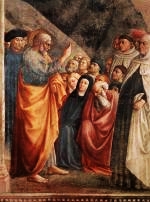 http://vintage.aomin.org/SBNDDHrep.html
http://vintage.aomin.org/SBNDDHrep.html
James White refutes the claims of scholarly Catholic apologists who state the historic church throughout the ages has always believed in 1) the Pope (citing Peter constantly as an argument that cannot stand against severe scrutiny) and 2) the infallibility of the Pope.
“Many centuries after the Council of Nicea, long after the rise of the Papacy into prominence (and just before its fall into the Pornocracy), supporters of this institution (the Papacy) began the process of changing history through the use of forgeries. Documents like the famous Donation of Constantine began to circulate. The very fact that men had to create such documents tells us something very important: the belief they wished to substantiate in history could not be substantiated any other way. That is, if people had always believed in the Papacy as it was developing in later centuries, there would be no need to create forgeries to make it look otherwise. One of the forgeries that can be traced to this period involves an expansion in the canons that were passed at the Council of Nicea. Originally the council passed twenty canons, including the famous 6th canon. Yet, centuries later, other collections began to appear. There is no question that these other canons are forgeries-fakes. Yet, amazingly enough, Scott Butler and his co-authors (RCC Apologists) cite from these forgeries in an attempt to substantiate their position! They are not alone here, and in fact, as the quotation below shows, they at least admitted that these canons are not part of the ‘generally accepted’ list. I have heard other apologists, such as Tim Staples, quote Canon 39 of the Arabic canons as if it were a part of the original Council of Nicea, a tremendously dishonest thing to do. On page 308 of Jesus, Peter & the Keys, we find the following:
(From the Arabic Canons of the Council of Nicaea):
‘[CANON XXXIX] Of the care and power which a Patriarch has over the bishops and archbishops of his patriarchate; and of the primacy of the Bishop of Rome over all.
‘Let the patriarch consider what things are done by the archbishops and bishops in their provinces; and if he shall find anything done by them otherwise than it should be, let him change it, and order it, as seemeth him fit; for he is the father of all, and they are his sons. And although the archbishop be among the bishop as an elder brother, who hath the care of his brethren, and to whom they owe obedience because he is over them; yet the patriarch is to all those who are under this power, just as he who holds the seat of Rome, is the head and prince of all patriarchs; inasmuch as he is first, as was Peter, to whom power is given over all Christian princes, and over all their peoples, as he who is the Vicar of Christ our Lord over all peoples and over the whole Christian Church, and whoever shall contradict this, is excommunicated by the Synod. [While not a part of the generally accepted canons of the Council of Nicea, these canons promulgated from the Eastern Church give a mind’s eye view of the thinking of Eastern Christianity.]’ Philip Schaff and Henry Wace, eds., Nicene and Post-Nicene Fathers–The Seven Ecumenical Councils, vol.14, (Peabody, MA: Hendrickson, 1994), 48.'”

